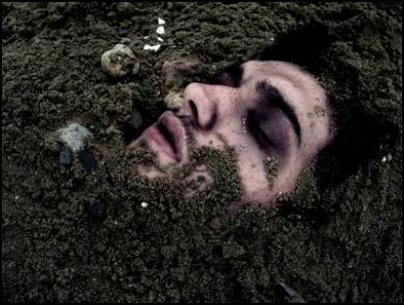Fringe Festival Review: Antigone
Review by Lyndon Hood
Matt Whelan as Creon in Antigone. Photo Credit: : Daniel Williams.
Antigone
By
Jean Anouilh
Almost a Bird Theatre Collective
Te Whaea
Theatre, 11 Hutchison Road, Newtown
15th (preview) - 18th
February – 8.00pm
Duration 2
hours
$15/$12/$10
Jean Anouilh's 1942 Antigone might be considered a study on Sophocles' original tragedy. After Oedipus' two sons kill each other fighting over Thebes, the new king, Creon, declares one of them, Polynice, to be the rebel, and announces a death penalty for anyone who give the body funeral rites. Antigone, sister of Polynice, niece to Creon and betrothed to Creon's son, buries the body. Creon has Antigone killed and the consquences destroy his family.
There's a sense that Anouilh sought to dissect out the essentials elements of the tragedy and then amplify them - resulting in a play noticably longer than the original, and one that, as well as being a tragedy, expounds a theory of tragedy. Anouilh's version spends plenty of time on the dialectical struggle between Creon's bureaucratic desire for absolute order and Antigone's defiance. Yet in the end he seems to discard it as unnecessary; the obsession of the play is tragic inevitability; Antigone dies because she must - because she is Antigone and he is Creon, in a confrontation no reason or natural fact can alter.
This idea is relentlessly pursued by the Chorus (Dan Musgrove) his open face glowing with the enlightened certainty of doom and his exposition of these idea and the back-story are compelling. His face is also glowing because the rest of the cast - the character of the play, are made up with pallid faces and shadowed eyes and cheeks. He hovers around the edges - the action take palace in the centre of an open diamond of seating - he rearranges the set, sometimes distracts and in one intriguing moment swaps the dialogue between the mouths of Antigone and Creon, as if to further separate the implacable forces at play from the actual individuals.
One way this inevitability played theatrically was that the characters could have little effect on each other. They argue, they "shout" (as the chorus puts it) on their fate, but do not change. Sophie Roberts as Antigone faces her destiny sorrowfully, and rails angrily at the treatment it entails, her performance in a middle ground between human uncertainty and unshakeable purpose. Antigone meets social pressure from every quarter to turn from her path. The guards who arrest her are played by the same actors who play her friends - a fact that the direction make unmissable and emphasises the conequences of stepping out of line.
Matt Whelan's Creon - interestingly more physically grounded than Roberts - faced his fate with touches of wry irony in a production where the performances could be characterised by general earnestness. He knows (and explains) that his actions in the presevation of order are as arbitrary and senseless and Antigone's rebellion - his cynical humour allows him to accept it.
The company declares that they are "research[ing] rebellion and truth in its most naked, raw and brutal form", which is to set a high bar. The production is certainly not emotionally unaffecting, but the play is strongest in exploring these ideas of authority and rebellion on this intellectual level.
This is one of two variations on the Antigone story at the Fringe. Antigone's Death runs from 21 to 23 Feb at Imerst.
Antigone press release
Fringe 07
website
Scoop Full Coverage: Fringe
07



 Richard S. Ehrlich: Deadly Border Feud Between Thailand & Cambodia
Richard S. Ehrlich: Deadly Border Feud Between Thailand & Cambodia Gordon Campbell: On Free Speech And Anti-Semitism
Gordon Campbell: On Free Speech And Anti-Semitism Ian Powell: The Disgrace Of The Hospice Care Funding Scandal
Ian Powell: The Disgrace Of The Hospice Care Funding Scandal Binoy Kampmark: Catching Israel Out - Gaza And The Madleen “Selfie” Protest
Binoy Kampmark: Catching Israel Out - Gaza And The Madleen “Selfie” Protest Ramzy Baroud: Gaza's 'Humanitarian' Façade - A Deceptive Ploy Unravels
Ramzy Baroud: Gaza's 'Humanitarian' Façade - A Deceptive Ploy Unravels Keith Rankin: Remembering New Zealand's Missing Tragedy
Keith Rankin: Remembering New Zealand's Missing Tragedy